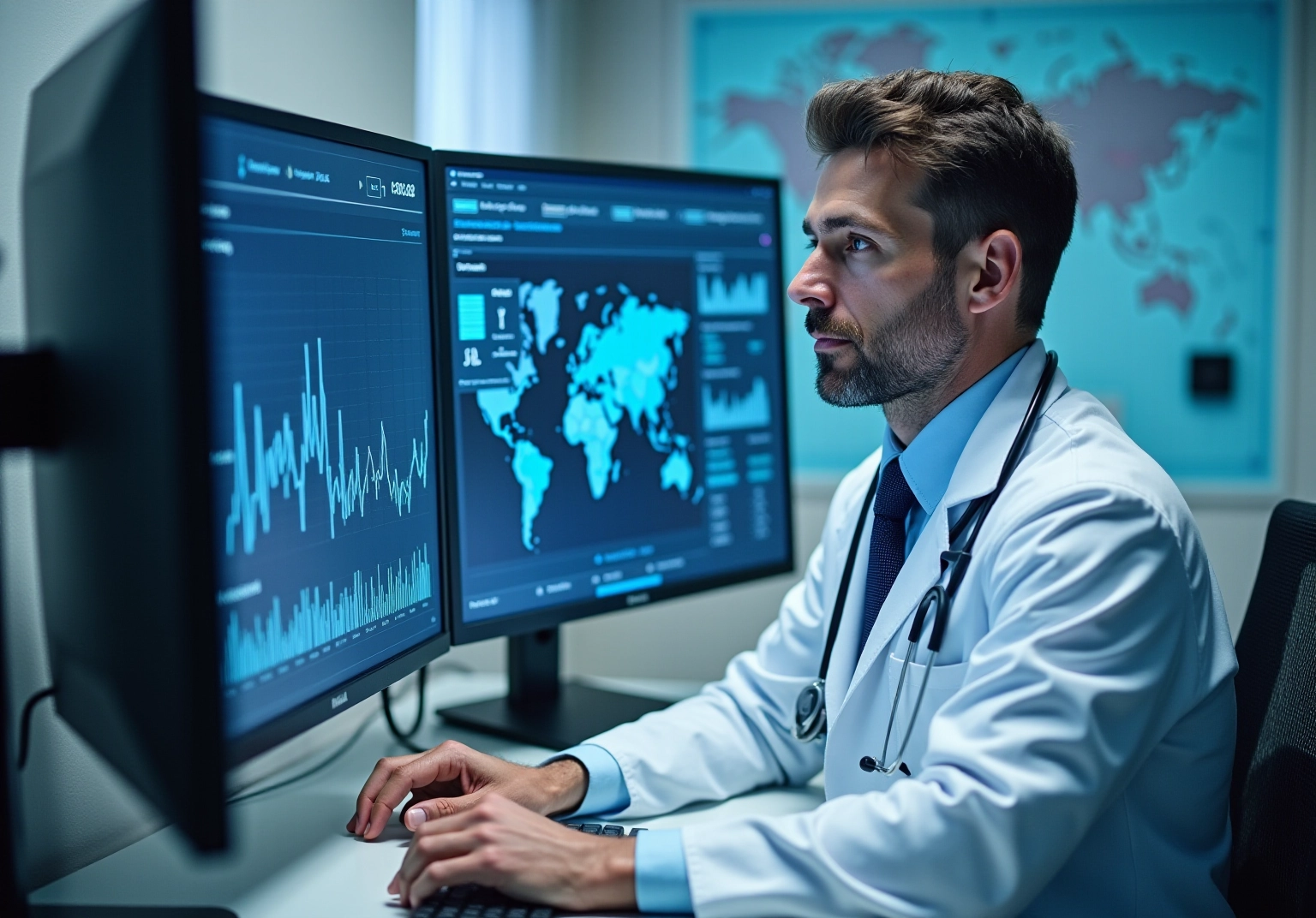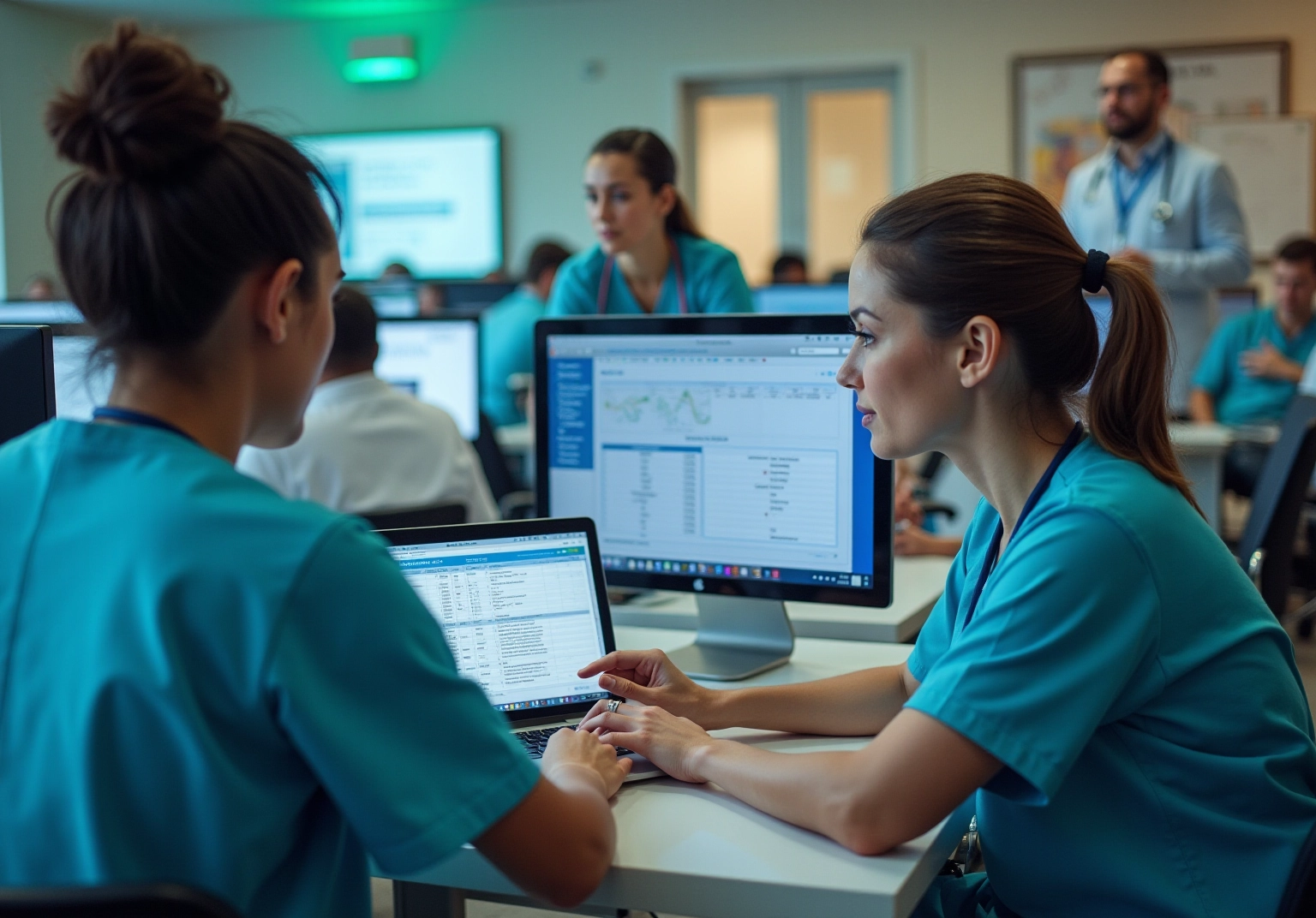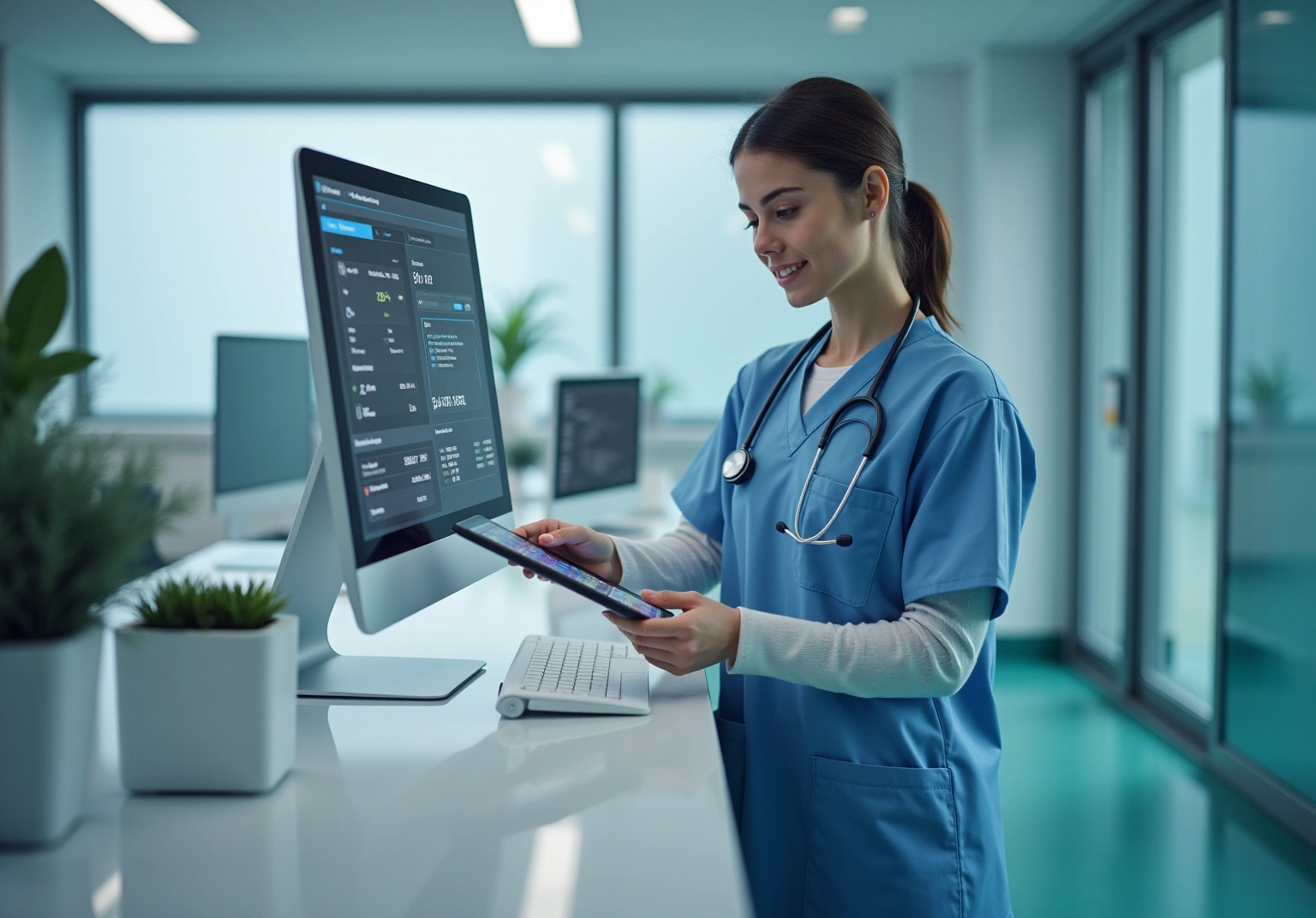
The article titled “10 Essential Features of Healthcare CRM Software for Efficiency” addresses a critical question: what key features are necessary for healthcare CRM software to enhance operational efficiency? It identifies essential features such as:
These elements collectively streamline processes, improve patient engagement, and ensure secure data management. Consequently, they significantly boost the overall efficiency of healthcare organizations, making a compelling case for the adoption of these technologies.
The healthcare industry is experiencing a transformative shift, driven by the imperative for efficiency and enhanced patient outcomes. As medical organizations increasingly embrace technology, healthcare CRM software has emerged as an essential tool, providing features that streamline operations and bolster patient engagement. Yet, with a plethora of options available, how can providers pinpoint the crucial functionalities that will genuinely elevate their practice? This article explores ten critical features of healthcare CRM software that not only promise to enhance operational efficiency but also address the urgent challenges faced by contemporary healthcare professionals.
The HCC Assistant revolutionizes the collection and analysis of clinical data by automating coding processes and providing real-time suggestions at the point of care. This innovation significantly alleviates the administrative burden on medical service providers, ensuring adherence to coding regulations and maximizing funding from Medicare Advantage contracts. By optimizing HCC coding and minimizing manual coding discrepancies, the HCC Assistant boosts the efficiency of risk adjustment processes and plays a vital role in enhancing overall financial performance for medical entities.
Case studies demonstrate that facilities utilizing the HCC Assistant have experienced reduced claim denials and expedited reimbursements, showcasing its effectiveness in transforming risk adjustment processes. As medical organizations increasingly adopt AI-driven solutions, the HCC Assistant stands out as a crucial component of healthcare CRM software, enhancing both compliance and operational efficiency.

Predictive analytics in healthcare CRM software harnesses historical data to anticipate individual behaviors and outcomes. By analyzing trends, healthcare providers can tailor their engagement strategies, enabling timely interventions and personalized care. This method not only enhances client satisfaction but also improves operational efficiency by optimizing resource allocation and reducing unnecessary costs.
For example, predictive models have been effectively implemented to identify individuals at high risk of readmission, facilitating proactive support that significantly decreases hospital visits. Moreover, medical organizations utilizing predictive analytics have reported improved individual adherence to treatment plans, highlighting the success of personalized communication strategies.
As the medical landscape evolves, the integration of predictive analytics into healthcare CRM software is becoming increasingly essential for fostering deeper relationships with individuals and promoting better health outcomes.

To ensure the protection of client information, healthcare CRM software must strictly comply with HIPAA regulations. This compliance involves implementing comprehensive security measures, including:
By ensuring HIPAA adherence, medical institutions can effectively protect sensitive information, significantly reduce the risks associated with breaches, and uphold trust—an essential element for nurturing successful relationships with individuals receiving care.
The financial consequences of information breaches are staggering, with the average cost in medical services exceeding $10 million in recent years, underscoring the necessity for robust cybersecurity measures. Moreover, organizations that fail to comply with HIPAA not only face potential fines but also risk losing trust from individuals, which can have long-lasting effects on their reputation and operational success.
Real-world instances demonstrate that providers who prioritize secure data management not only safeguard their clients but also enhance their overall service delivery, ensuring a reliable environment for care.

Multichannel assistance in healthcare CRM software addresses the critical need for providers to engage with individuals across various platforms, including phone, email, text, and social media. This flexibility empowers individuals to communicate through their preferred channels, significantly enhancing engagement and satisfaction. Notably, studies indicate that 80% of individuals favor digital communication methods for appointment notifications and follow-ups, underscoring the necessity for medical entities to adapt their communication strategies.
By implementing effective communication approaches, such as personalized messaging and timely reminders, medical providers can cultivate stronger relationships with clients. For instance, entities leveraging analytics-driven communication strategies have reported response rates soaring by 41-62%, demonstrating the power of customized engagement.
As client expectations evolve, integrating multichannel support with healthcare CRM software not only enriches experiences but also positions medical entities to meet the growing demand for accessible and responsive care.
Optimizing workflows in healthcare CRM software is crucial for enhancing operational efficiency by streamlining processes and minimizing redundancies. Inferscience’s Care Gaps app exemplifies this by automating the identification, review, and closure of clinical care gaps. This functionality allows healthcare organizations to prioritize care effectively. By uploading care gaps, providers can quickly analyze and document necessary interventions, leading to faster service delivery and enhanced outcomes for individuals. This shift not only reduces administrative burdens but also encourages collaboration among staff, significantly enhancing satisfaction, with ratings from virtual visits reported at nearly 90%.
Furthermore, the integration of AI-powered solutions and advanced NLP tools enhances productivity and accuracy in HCC coding, addressing common issues related to data silos and manual coding inconsistencies. Organizations that adopt effective scheduling methods and telemedicine capabilities can anticipate significant enhancements in client flow and overall care quality. However, it is important to note that 90% of automation projects fail due to technical issues, highlighting the need for a clear strategy when considering automation investments.
As the medical field progresses, adopting automation and utilizing healthcare CRM software from Inferscience’s solutions is crucial for entities seeking to enhance workflows and provide exceptional experiences for individuals.

Healthcare CRM software addresses a critical challenge for healthcare providers: the need for efficient and accurate client information management. By enabling the collection and examination of individual details, this software fosters tailored care strategies that enhance patient outcomes. Integrating both structured and unstructured data into a single system allows medical entities to eliminate cumbersome manual processes, ensuring that all medical conditions are documented with precision.
This comprehensive view of individual health not only enhances insights but also optimizes Hierarchical Condition Category (HCC) coding documentation through AI-driven solutions. Such advancements lead to improved risk adjustment and maximize Medicare reimbursements. Moreover, utilizing the right HCC coding tool significantly mitigates manual coding inconsistencies, effectively addressing the pervasive issue of human error.
Understanding each person’s history, preferences, and needs empowers medical organizations to customize their services efficiently. This customization promotes patient loyalty and enhances overall satisfaction. Case studies further illustrate how these strategies have successfully improved client outcomes and operational efficiency, demonstrating the tangible benefits of adopting healthcare CRM software.

Real-time monitoring features in healthcare CRM software empower providers to consistently track individual conditions, fostering timely interventions and informed decision-making that are crucial for managing both acute and chronic situations. By leveraging real-time information, medical organizations can significantly enhance client safety and improve overall care quality.
Research indicates that remote health monitoring (RPM) has led to a remarkable 76% decrease in hospital readmission rates, underscoring the efficacy of prompt information in preventing complications. Furthermore, medical providers utilizing real-time analytics have observed a 41% reduction in chronic care admissions, highlighting the importance of immediate access to information in improving individual outcomes. Additionally, RPM has achieved a 47% reduction in total medical appointments and in-person visits, further demonstrating the effectiveness of real-time monitoring.
Notably, older individuals engaged in RPM-based care experienced 40% fewer hospital admissions, emphasizing the impact of real-time data on at-risk populations. Continuous monitoring of individuals’ conditions not only encourages proactive care but also aligns with the growing trend of integrating technology into medical practices, ultimately resulting in enhanced engagement and satisfaction.
As Michael Fragala articulates, “Telehealth and virtual care have experienced growth over the last few years, and remote monitoring (RPM) has become a crucial component of this technology.
Integration functionalities in healthcare CRM software are essential for ensuring seamless data transfer among various systems, including electronic health records (EHRs), billing, and client management platforms. This interoperability equips medical professionals with comprehensive individual information, crucial for informed decision-making and improved care coordination.
Organizations that successfully integrate their systems can achieve significant operational efficiencies, minimizing the risk of errors and enhancing patient outcomes. A study revealed that hospitals with robust EHR systems reported a 1% reduction in adverse incident rates, underscoring the importance of EHR integration within the medical sector. Furthermore, medical systems that have adopted healthcare CRM software have seen a 24% increase in completed surgeries, demonstrating how effective information flow can directly impact clinical performance.
Inferscience’s API solution addresses the challenges of interoperability in the medical field by enabling seamless HCC coding information exchange among providers, payers, and third-party vendors. The API extracts and analyzes claims information using intelligent rules, delivering insights in JSON format that can be accessed in seconds. Inferscience’s Claims Assistant further enhances this integration by conducting real-time gap analysis on claims files, recommending HCC codes that bolster billing accuracy and operational efficiency.
By prioritizing the use of healthcare CRM software, medical institutions can foster improved collaboration among care teams, ultimately leading to enhanced treatment quality and patient satisfaction. Additionally, with Inferscience’s commitment to data security, evidenced by their SOC2 Type II certification, CFOs can trust that integrating CRM systems with existing medical data will maintain high standards of information protection.

Efficient feedback management within healthcare CRM software allows organizations to systematically gather and evaluate client feedback, which is essential for enhancing service quality. By understanding individual experiences and identifying areas for improvement, healthcare providers can elevate service quality and increase satisfaction. This proactive approach fosters a culture of continuous enhancement and responsiveness to client needs.
Research indicates that effective communication can boost adherence rates by 19%, underscoring the importance of evaluating feedback for ongoing improvements. Furthermore, with 80% of Americans endorsing remote monitoring of individuals, the growing significance of engagement tools in the medical field is undeniable.
As healthcare evolves—particularly in the wake of the COVID-19 pandemic—prioritizing feedback from those receiving care is crucial for delivering high-quality services and maintaining a competitive advantage. As Bill Gates aptly stated, “We all need people who will give us feedback. That’s how we improve.”
Addressing challenges such as medication non-adherence through effective feedback management can markedly enhance health outcomes.
Healthcare CRM software that ensures round-the-clock availability is essential for allowing individuals to access support whenever they need it. This capability addresses urgent inquiries and provides prompt assistance, significantly improving satisfaction.
Research indicates that 42% of individuals encounter difficulties in contacting their provider, which poses a considerable barrier to effective communication, underscoring the need for ongoing support. By maintaining this constant availability, healthcare organizations can enhance client engagement and foster trust in their services using healthcare CRM software.
Furthermore, with 96% of client complaints related to customer service issues, effective communication is paramount. Organizations that prioritize continuous patient support through healthcare CRM software not only elevate their service quality but also cultivate greater patient loyalty and satisfaction, ultimately leading to improved health outcomes.

The exploration of healthcare CRM software highlights its pivotal role in enhancing operational efficiency and patient outcomes within the medical industry. By integrating essential features such as HCC coding assistance, predictive analytics, HIPAA compliance, and multichannel support, healthcare providers are equipped to tackle the pressing challenges they face today. Each of these functionalities streamlines processes and fosters stronger relationships with patients, ultimately leading to improved care quality and satisfaction.
Key insights from the article underscore the importance of:
These features empower healthcare organizations to make informed decisions, respond promptly to patient needs, and maintain a high standard of service. The emphasis on customer data management illustrates how personalized care strategies can significantly enhance patient loyalty and health outcomes.
As the healthcare landscape continues to evolve, embracing these CRM software features is not merely a choice but a necessity for organizations aiming to thrive. Investing in technology that prioritizes efficiency and patient engagement will not only meet current demands but also position healthcare providers for future success. Adopting these essential tools can transform the way care is delivered, ensuring that patients receive the attention and support they deserve, at any time.